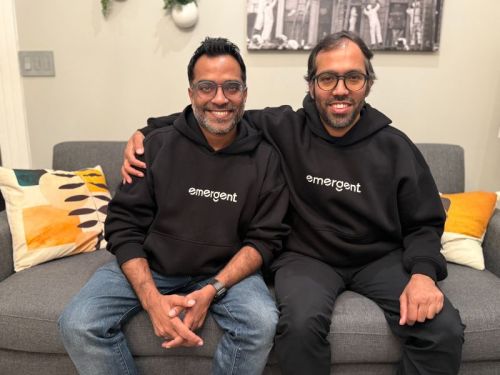Over the last decade, improvements in smartphone camera quality helped popularize platforms like Instagram, YouTube, and TikTok for sharing photos and videos. This shift turned many casual users into creators who earn money. A company named Emergent, founded by twin brothers Mukund and Madhav Jha, aims to become a similar platform but for creating apps. It allows non-technical users to build an app simply by using prompts.
While this idea is not entirely unique in 2025, Emergent focuses on guiding users through the entire app development process. The platform manages different APIs and deployment steps so users do not have to worry about technical details.
The startup recently announced it has raised 23 million dollars in Series A funding. The round was led by Lightspeed, with participation from Y Combinator, the Together Fund from Freshworks founders, and leading angels such as former a16z general partner Balaji Srinivasan, Google’s Jeff Dean, and Mistral founding team member Devendra Chaplo. To date, the company has raised a total of 30 million dollars.
Mukund Jha was previously the CTO at Dunzo, a Google-backed quick commerce startup in India. He left the company and moved to the United States, where he began considering what to build with his brother Madhav, who had worked at Dropbox. Both brothers are highly technical and have been programming since they were twelve years old. In late 2023, they spent time with people at various AI labs and realized that AI-powered coding was poised for significant growth. They believed that agent-based app development would become a major part of the economy and decided to focus on solving that problem for the next twenty years.
Emergent is clear that it does not want to compete with developer-focused tools like Claude Code and Cursor. Instead, it aims to abstract the software development lifecycle for non-technical users. The company has built its infrastructure from the ground up to support app development. For instance, since non-technical users may not understand code errors, Emergent has developed AI agents that automatically find and fix those errors.
In a test of the platform, a user built a vaccine and medicine tracker for their pets. Starting with a simple prompt, the AI agent asked numerous clarifying questions about the types of pets, whether the app was for multiple users, and how reminders should be scheduled. It automatically added features like a dashboard and a simple way to add pets and vaccinations. The entire process of building and auto-testing the app took less than thirty minutes, resulting in a satisfactory first version. This performance gives Emergent an edge over other vibe coding apps that often fail with their own pre-generated prompts.
Since its launch last year, more than one million people have built over 1.5 million apps using Emergent. While users are eager to experiment with vibe coding, platforms must also help users maintain their apps over time. Emergent addresses this by managing deployment and backend infrastructure, making app maintenance easier for people.
Currently, the startup uses Expo as a mobile client to deploy apps, but it plans to launch its own native mobile app soon. To simplify integrations, Emergent uses a universal API key with shared usage, saving users from creating accounts for various services or model providers.
Although vibe coding apps promise creation without technical experience, users often encounter technical terms. Emergent aims to educate its users on topics like APIs and how to choose different components, such as an email sending mechanism. The company is also building a brainstorming mode to help users who have an idea but are unsure of their app’s final form navigate the ideation stage.
For an app economy to be sustainable, developers need ways for their apps to be discovered and to generate revenue. Currently, Emergent features some apps on its homepage, but that is the extent of its discovery system. Developers can integrate payment options like Stripe, but they must supply their own API key. Emergent intends to make both discovery and monetization easier in the future.
The company faces significant competition. Startups like Canva and Figma, along with browsers such as Perplexity, Comet, and Opera Neon, are encouraging users to build mini apps. Other startups focused on vibe coding for a non-technical audience include Seven Seven Six-backed Vibecode and Rocket, which recently raised 15 million dollars in a Series A round led by Accel.
Hemant Mohapatra, a partner at Lightspeed, stated that the venture firm was seeking a startup with deep technical expertise capable of bringing app-making to the masses. Emergent performed above expectations during testing. He explained that a major roadblock to participating in the digital economy is the ability to code, and they wanted to invest in a company that lowers that barrier to nearly zero, making app creation a function of intent. Mohapatra noted that Emergent stood out because it supports the entire post-development lifecycle, including deployment, sharing, bug fixing, and support, all powered by AI.

